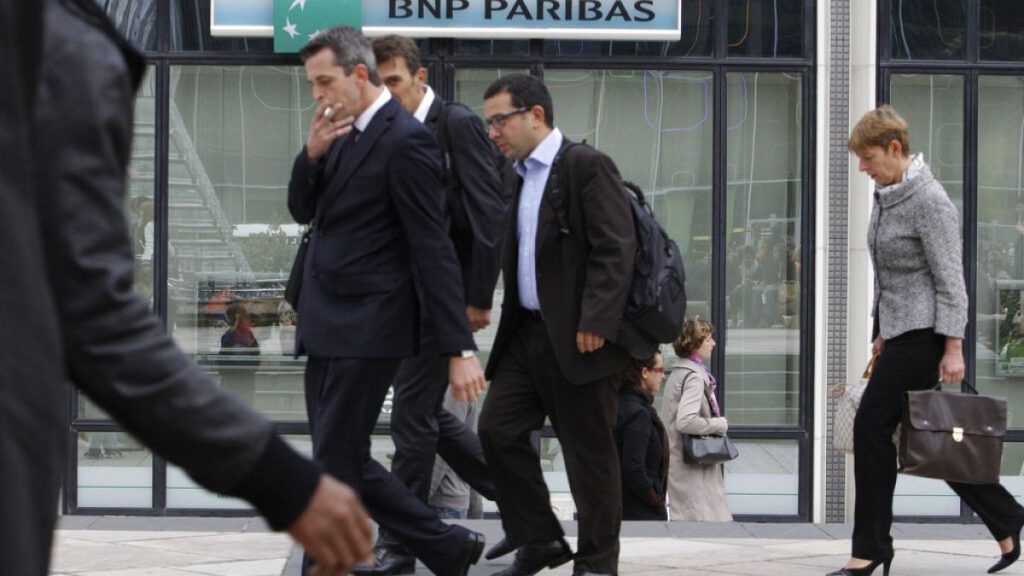BNP Paribas’s Stellar Performance Bolstered by Investment Banking Strength
BNP Paribas, the eurozone’s largest bank by assets, delivered a resounding fourth-quarter performance, exceeding market expectations and driving its share price upward. The bank reported a 15.7% surge in net income to €2.32 billion, outperforming analyst estimates of €2.24 billion. This impressive growth was primarily fueled by the robust performance of its investment banking division, which capitalized on favorable market conditions. Corporate & Institutional Banking revenues soared by 20.1%, while Global Markets revenues saw a remarkable 32.4% increase, driven by a surge in equity and fixed income trading activities. Other divisions contributed to the positive momentum, with Commercial, Personal Banking & Services, Insurance, and Wealth Management all posting revenue growth. However, the bank’s leasing and consumer finance segments faced headwinds from declining used-car prices, impacting retail banking profitability. Despite a slight downward revision to its 2025 return on tangible equity (ROTE) target to 11.5%, BNP Paribas maintains confidence in achieving a 12% ROTE by 2026, underpinned by cost-cutting measures and the anticipated benefits of its AXA Investment Managers acquisition. The bank further rewarded shareholders with a dividend increase and a new share buyback program, further bolstering investor confidence.
UBS Navigates Integration Challenges Amidst Regulatory Headwinds
In contrast to BNP Paribas’s success, UBS Group AG faced a more challenging quarter, with results falling short of market expectations and triggering a decline in its share price. Despite reporting a return to profitability with a net profit of $770 million, the bank missed analyst estimates on earnings per share and revenue. While revenue did increase year-on-year, it fell short of consensus forecasts. The bank announced a dividend and share buyback program, but these measures were overshadowed by concerns over rising regulatory capital requirements in Switzerland. The integration of Credit Suisse, acquired by UBS in mid-2023, remains a key focus, with the bank expressing confidence in completing the integration by 2026. However, the potential impact of increased capital requirements adds uncertainty to the bank’s outlook.
Divergent Paths: BNP Paribas’s Diversification Versus UBS’s Integration Focus
The contrasting performance of BNP Paribas and UBS highlights the divergent paths taken by these two major European banks. BNP Paribas benefited from its diversified business model, with strength in investment banking offsetting weakness in other areas. This diversification allowed the bank to capitalize on market opportunities and deliver strong overall results. UBS, on the other hand, is navigating the complex integration of Credit Suisse amidst a changing regulatory landscape. While the integration presents significant opportunities for growth, it also introduces challenges and uncertainties that are impacting the bank’s short-term performance.
BNP Paribas’s Strategic Positioning for Future Growth
BNP Paribas’s CEO, Jean-Laurent Bonnafé, emphasized the bank’s robust performance and its strategic positioning for future growth. The diversified and integrated business model is seen as a key strength, enabling the bank to navigate economic cycles effectively. The acquisition of AXA Investment Managers is expected to further enhance the bank’s capabilities and contribute to long-term growth. The bank’s focus on cost-cutting measures and growth initiatives provides a solid foundation for achieving its financial targets beyond 2026. The implementation of a semi-annual interim dividend also reflects the bank’s commitment to shareholder returns.
UBS’s Integration Progress and Regulatory Uncertainties
UBS CEO Sergio Ermotti highlighted the bank’s progress in integrating Credit Suisse and expressed confidence in achieving its financial targets. The integration is expected to be substantially completed by the end of 2026, unlocking significant synergies and growth opportunities. However, the looming changes to the Swiss regulatory landscape, particularly concerning capital requirements, introduce a layer of uncertainty to the bank’s outlook. These potential changes could significantly impact UBS’s capital position and future profitability. The bank acknowledges these uncertainties and their potential influence on forward-looking statements.
Contrasting Outlooks: BNP Paribas’s Optimism Versus UBS’s Cautious Approach
The contrasting performance and outlooks of BNP Paribas and UBS underscore the different challenges and opportunities facing European banks. BNP Paribas, with its diversified business model and strong performance, projects an optimistic outlook for future growth. The bank is well-positioned to capitalize on market opportunities and deliver value to shareholders. UBS, while confident in its integration strategy, adopts a more cautious approach due to the uncertainties surrounding regulatory changes. The integration of Credit Suisse presents both significant potential and potential challenges that will shape the bank’s future trajectory.














